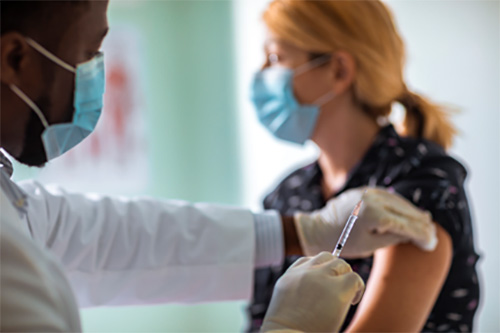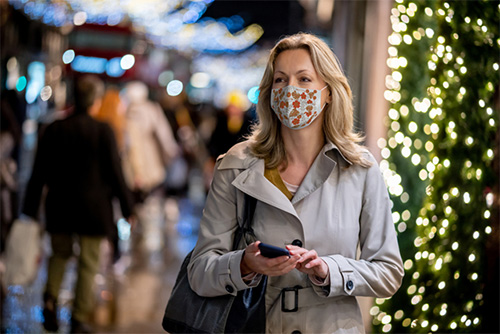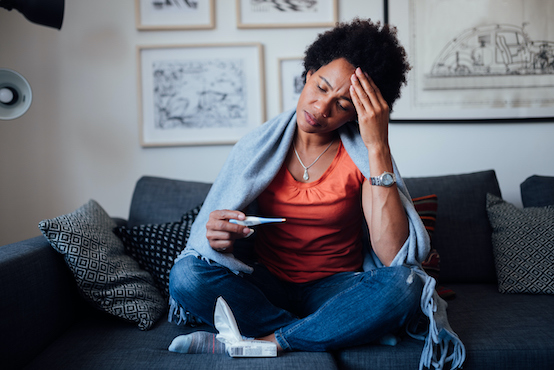Authored by Dr. Pier Boutin, MD
The aim of the vaccination campaign against Covid-19 is herd immunity — the point at which so few people are susceptible to infection that the virus runs out of places to go. It’s anticipated that we’ll cross this threshold when 80-90% of us are immune to the virus, either because we were previously infected and now have lasting immunity, or because we’ve received a vaccine.

We have a ways to go to hit these numbers. At the end of 2020, The Economist estimated that 20% of Americans had been infected with Covid-19, leaving us with a gap to reach herd immunity of about 70%.
If we did nothing and infection continued to spread at its current rate, it could take up to three to four years to reach herd immunity. That would mean years of packed hospitals, dying family and friends, business failures and burgeoning national debt.
On the other hand, a robust vaccine program that ramps up to inoculate an average of three million people per week could cut the time it takes to reach herd immunity by 2.5 years. Staggering! Even Dr. Tony Fauci has predicted that with a successful immunization program, life could be back to normal in the USA by this fall.
So, there’s no question an effective vaccine is good for our country.
But is the Covid-19 vaccine good for you?
To answer this question, consider these four factors:
Is the Covid-19 vaccine safe?
As of January 18, at least 11 million people in the US have received the first dose of the Pfizer vaccine or the Moderna vaccine, both of which were approved by the FDA in November 2020. In their clinical trials, efficacy was broadly consistent across all age groups. No severe adverse reactions were recorded and mild side effects appeared in under 5% of participants. As vaccines are administered, the most commonly reported side effect is mild discomfort at the injection site, which is typical for any vaccine injection.
Both vaccines are the first ever developed using the technology of “messenger RNA” (mRNA) to produce immunity. Vaccine opponents have centered their objections around the newness of this method. Here’s what we know: the science of mRNA is biologically plausible as the method essentially duplicates the pathway in the body by which a pathogen triggers a response from the adaptive immune system. We use such “bioidentical” methods in many other settings; why not here? The irony is that the new mRNA technology may prove to be safer than the older vaccine methods – so let’s move on from that argument.
Is one vaccine type better than another?
Right now we don’t know enough to answer that. But we can say that the new mRNA vaccines have set a very high bar in the trials to date: it will be tough for the other types of vaccines to offer comparable or better results. It could be that one of the other candidates does a better job with certain subgroups, such as the elderly (whose immune systems broadly speaking are different than in younger people) or those who are truly immune-compromised. It’s quite possible that the mRNA will be superior in every respect.
As for what’s on the horizon, there are three basic types of CoV-2 vaccines in advanced trials: the new mRNA vaccines, a “protein subunit vaccine” that uses proteins of the virus to stimulate an adaptive immune response; and “vector vaccines” based on the old attenuated-virus method, in which a live virus has been weakened to the point at which it stimulates an adaptive immune response without causing an infection.
Which vaccine type does a better job of protecting all groups, providing long-term immunity, and with the least side effects? It’s going to take a year or two before we can answer those questions with total confidence. That means you’re going to have to make a decision about the vaccine that’s right for you before then.
Who should be especially “worried” about taking an “unproven” vaccine?
So far, no groups are contraindicated from receiving a vaccine. Even pregnant women are advised that the Pfizer vaccine is safe. Notably, a big percentage of the early recipients of the Pfizer-BioNTech vaccine are nursing home residents, in effect an extension of the safety phase of the trials. This will never be a totally risk-free decision, no matter how much data we gather. There’s just too much variation from one person to the next; some people have adverse reactions to anything, and some of those reactions are serious. But that’s true about every risk we take, from crossing the street to flying in an airplane.
Special note about anaphylaxis: Pfizer vaccine recipients in the UK suffered anaphylaxis following injection, prompting regulators to mandate a 15 minute “watch period” to ensure patients don’t have a reaction. This could be due to the polyethylene glycol content in the vaccine.
Vaccines are also in theory important not only for children, who are born as a kind of “blank slate” without an educated immune system (but a strong innate immune response), but for older people, whose immune systems are weakened and seem to lose the ability to recall prior threats. Add to that the high contagion rate of CoV-2…the lasting complications that arise in so many victims, even the young and apparently healthy…its highly novel presentation to the immune system… and the mixed evidence that even prior infection doesn’t always confer long-term immunity…
All of this together is helping a clearer picture to emerge. Our current view is that the first two vaccines seem remarkably safe and effective, the benefits far outweigh the risks, and so everyone should consider getting vaccinated as soon as you are eligible.
If? When? And Which One? are deeply personal questions, which only you can answer.
What say you?











